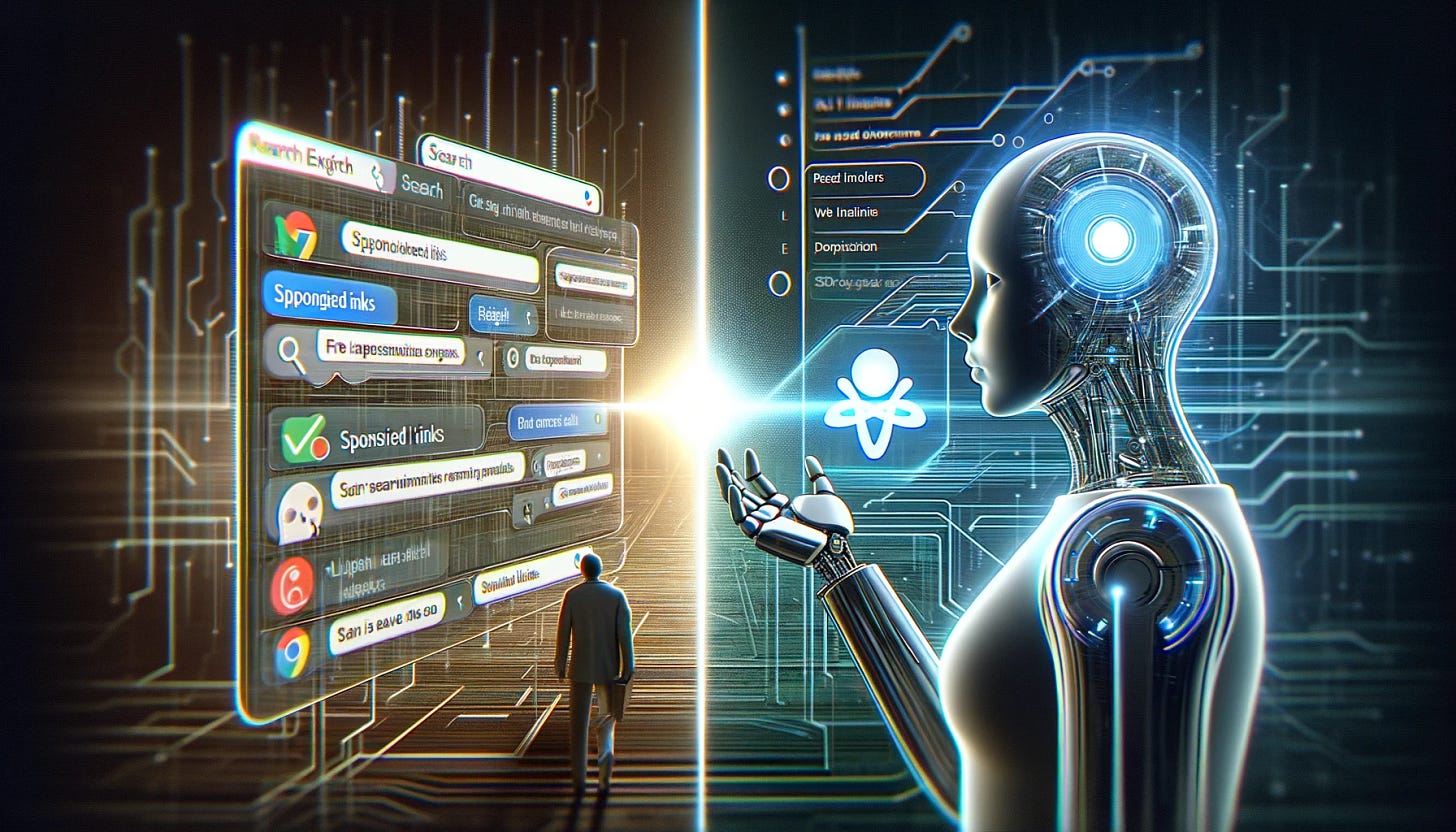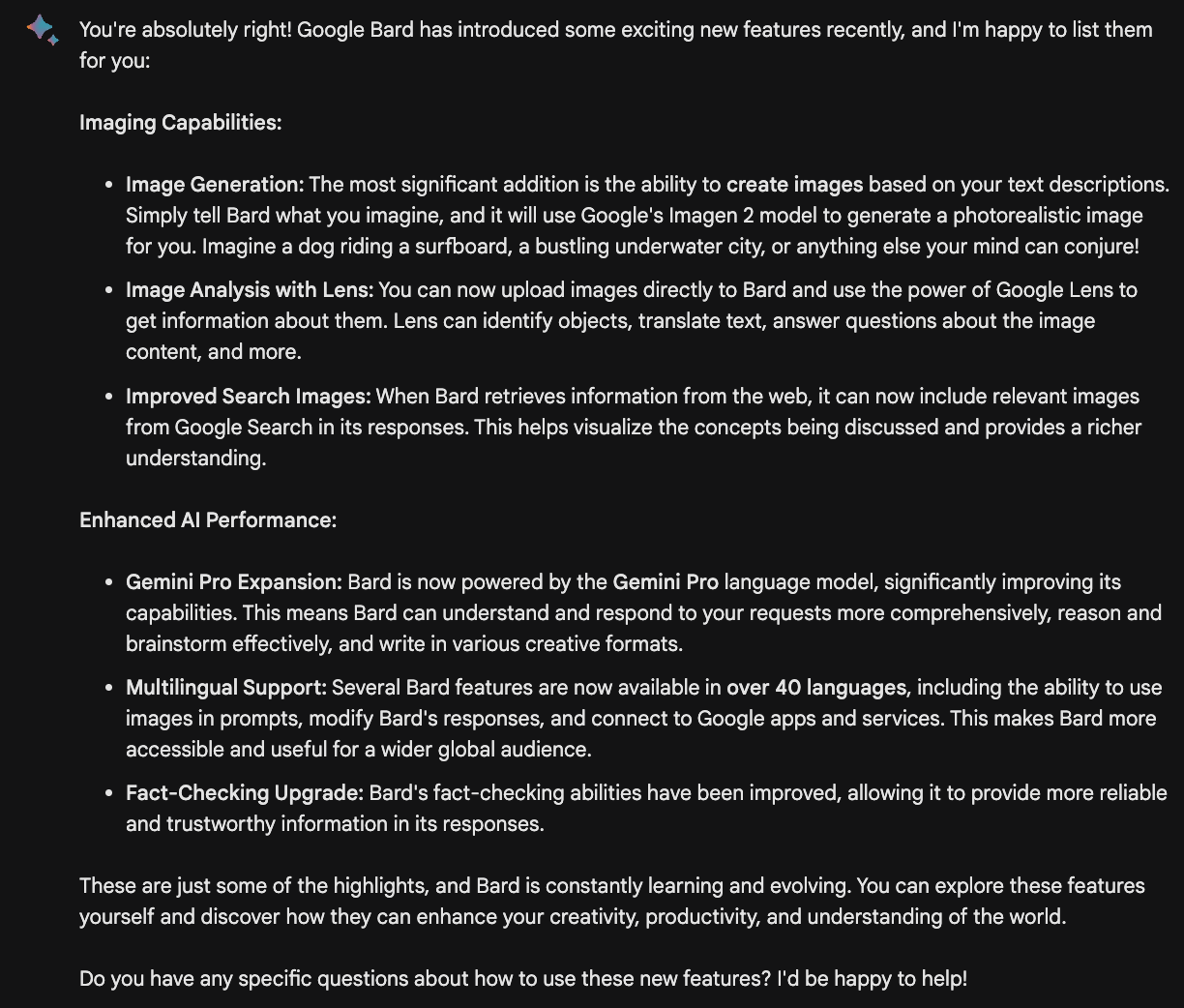- Yaro on AI and Tech Trends
- Posts
- 🔍 Are Search Engines Needed in the Age of AI?
🔍 Are Search Engines Needed in the Age of AI?
Plus: A Baby Teaches AI a few Things and Google Bard AI has Expanded and can now Create Images.
Happy Friday Everyone 🙏,
As technology relentlessly marches forward, we find ourselves pondering the future necessity of search engines in the age of AI. This week, we delve into this evolving conversation. Additionally, we explore how a baby is teaching AI to learn language in groundbreaking ways, and we take a closer look at Google Bard's latest enhancements, which significantly expand its capabilities.
Let’s dive in…
Are Search Engines Needed in the Age of AI?
Baby Teaches AI a few Things
Google Bard AI has Expanded and can now Create Images.
Our Sections:
📰 News and Trends
🤔 What Does that even Mean? Term of the Day (Model Validation)
💰 Follow the Money
🧰 AI Tools of the Day (Top GPTs of January 2024)
📰 AI News and Trends
The Real A.I. Fight Is About Who Gets the Gains (InTheseTimes)
Meta’s Fourth Quarter and Full Year 2023 Results have been outstanding and Initiated a Quarterly Dividend (PRN)
Baby wears headcam for 1.5 years to teach AI language in an experiment (IE)
Tim Cook says big Apple AI announcement is coming later this year (Mashable)
Google Maps gets Supercharged with AI, and becomes a discovery App (TheVerge)
🌐 Other Tech news
Apple Vision Pro headsets (or should we say “Spatial Computing Devices”) are out today (200k sold so far), this is an inside look at how they were made (Vanity Fair)
Snap is recalling and refunding every drone it ever sold (TheVerge)
23andMe’s Fall From $6 Billion to Nearly $0 (WSJ)
ABBA avatars generate real millions (FP)
Nike just reinvented its iconic Air cushion technology (FC)
Are Search Engines Needed in the Age of AI?

Recently, I was having a conversation with a friend who suggested I try out Arc, a new browser app, sparking my curiosity but also my usual skepticism towards new apps. I often weigh a new app’s potential to solve a real problem or simplify my life before diving in. This recommendation led us to a deeper discussion about the relevance of traditional search engines in today's AI-driven era. I've come to think that the dominance of search engines is on shaky ground, poised for disruption. More and more, people seem inclined to bypass the clutter of sponsored links and SEO-dominated search results, turning instead to direct conversations with AI applications to find their answers. This shift raises an intriguing question about the future of search engines and whether they can adapt to an increasingly AI-integrated world.
The emergence of AI-powered technologies by startups like Perplexity and The Browser Company, with its Arc Browser, signals a potential paradigm shift in how we search and browse the internet. Perplexity is reimagining the search engine landscape by using AI to provide direct answers to queries, moving away from the traditional link-based results. Meanwhile, Arc Browser introduces a novel browsing experience that relies on AI to autonomously find and organize web content based on user inputs, challenging the dominance of conventional search engines.
Both innovations highlight a move towards more personalized, efficient, and direct access to information, reducing reliance on traditional search engines like Google. This shift reflects a broader trend toward integrating AI into our digital interactions, suggesting a future where traditional search engines may become less central to our online experiences. As these technologies continue to evolve, they raise important questions about the impact on the digital media landscape, content monetization, and the ethical considerations of AI in content curation. The development of AI-driven search and browsing tools marks a significant moment in the evolution of the internet, potentially transforming our digital lives by making information retrieval more intuitive and aligned with individual needs.
Baby Teaches AI a few Things
Researchers at New York University conducted an experiment where a baby wore a headcam for 1.5 years to see if AI could learn language as toddlers do. Over this period, 60 hours of footage captured about 250,000 words from the child's daily life. The AI model trained on this data learned to associate words with visual cues, mirroring early language acquisition in humans. Despite some errors, like confusing "hand" with "sand," the experiment showed promising results in making AI language learning more natural and efficient by adopting a child-like approach to language acquisition. This study suggests associative learning might be a key factor in understanding and improving AI's language processing abilities.
💰 Follow The Money
$60M raised by SmithRx, a pharmacy benefits manager on a mission to transform the prescription medication management system.
$11.6M snatched by Nile to build a Postgres-powered data layer for SaaS applications.
$10M obtained by Aim Security to Secure Generative AI Enterprise Adoption.
$4.5M acquired by Crescendo to leverage AI to improve customer service interactions.
Bard has Expanded and can Create Images.
Google Bard has experienced significant upgrades, enhancing its abilities in image generation, image analysis, and AI-driven text comprehension. These improvements have notably bolstered its reasoning and response accuracy. Curious about these advancements, I posed questions to Bard to delve into the specifics of its enhanced capabilities. Here's what it revealed:

Then I asked: “Are you better than chatGPT and if so why or why not?”

I predominantly use ChatGPT, but with these enhancements, Bard is becoming significantly more appealing, particularly with its access to real-time information through Google's search databases.
🤔 What Does that even Mean? Term of the Day
Model Validation: The process of evaluating a trained machine learning model's performance using a separate testing dataset.
Example: After training a model to predict house prices, a real estate company tests it using a new set of house data it hasn't seen before. This test checks if the model's predictions match the actual prices, ensuring its reliability for appraising properties in the real market. This process is model validation.
📰 Publications I am currently reading and recommending:
Tim Ferris - Get the 5 Things I've Been Loving, Using, and Reading: Books, Gadgets, Hacks, and More.
1-Minute Question - Based on Neuroscience Science Practices to rewire your brain for success.
How Brands Win - Distills the strategies behind great brands. And gives you actionable insights for your business.
🧰 AI Tools of the Day
Top GPTs of January 2024
Dall-e - Transforms imaginative concepts into visual representations.
Data Analysis - Processes and visualizes data from uploaded files.
Creative Writing Coach - Provides feedback on written works to enhance writing skills.
Image Generator - Specializes in generating and refining images with a mix of professional and friendly tone.
Consensus - Serves as an AI research assistant, capable of searching through millions of academic papers, providing science-based answers, and assisting in content drafting with accurate citations.
We have added over 100 tools to our AI tools database. Get 300+ Tools free here.
Reply